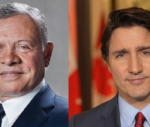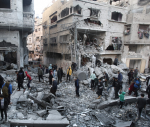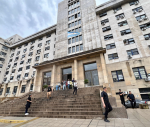You are here
Israeli protesters fixated on themselves and Israel's flawed democracy
Mar 29,2023 - Last updated at Mar 29,2023
Faced with increasingly strident mass protests against Israeli Prime Minister Benjamin Netanyahu's plan to overhaul the country's supreme courts, he has agreed to a "delay" in adoption while discussions among the proponents and opponents proceed. Fearing civil strife, Netanyahu falsely blamed minority "extremists" for 12 weeks of turmoil which have threatened to turn Israeli secularists against his ultra-religious and ultra-nationalist coalition partners and their constituencies. If he fails to reach a compromise both his Cabinet colleagues and opponents can accept, Netanyahu faces two possibilities: His government could fall or mass protests could be ramped up by nation-wide strikes.
The protests by Israelis condemning their right-wing government's drive to politicise the country's supreme court have captured the attention of the world media and public. Protesters contend correctly that Netanyahu and his coalition partners seek to overthrow Israeli democracy by eliminating checks on the Knesset and prime minister, provided by the court - and only the court.
Israel has no constitution to provide checks-and-balances which are essential for democratic governance. At the time of Israel's establishment, Israel's diverse leadership issued a Declaration of Independence but could not agree on a constitution. Its leaders resorted to the adoption of Basic Laws to take the place of a constitution.
The proposed judicial overhaul would give the government a majority of seats on the nine-member committee which chooses judges and grant the Knesset the right to decide what cases would be submitted to the court and the power to override supreme court rulings.
Another element of the package makes it difficult to declare a sitting prime minister unfit for office and limits reasons to mental or physical disability. Only a prime minister facing disqualification or two-thirds of the Cabinet can decide on disqualification.
As the bill on the disqualification issue has already been adopted, it could save Netanyahu from removal if he is convicted during his protracted trial for fraud, bribery and breach of trust. Before assuming the premiership in the current coalition, Netanyahu signed a conflict-of-interest deal banning his involvement in the supreme court overhaul. The Court is considering a petition declaring Netanyahu unfit for office because he has violated the deal.
Right-wing nationalist and religious colonists, who dominate Netanyahu’s coalition, are eager to curb Supreme Court rulings ordering the evacuation of West Bank outposts which are considered illegal under Israeli law. They also seek to limit court decisions in favour of Palestinian citizens of Israel or Palestinians living in occupied East Jerusalem and the West Bank where they face home demolitions and deportation. Israeli women fear religious conservatives could roll-back freedoms they enjoy.
February polls conducted by the Israel Democracy Institute reveal that only 24 per cent backs the overhaul as it stands, 72 per cent favours compromise, 63 per cent thinks the method of appointing judges should remain, and 66 per cent believes the court should have the power to abrogate laws. Sixty-two per cent prefers leaders to halt or postpone the reforms, including 42 per cent of Netanyahu voters. Nevertheless, he continues to push for adoption. This poll exposes as a lie his claim that the overhaul is supported by a the majority of Israelis who voted for parties belonging to his coalition.
Hundreds of thousands of Israelis have demonstrated against the overhaul since January 14th. On Monday banks, shops, local councils began a nation-wide strike although schools remained open. While ultra-Orthodox, colonist, and ultra-nationalist parties continued to back Netanyahu, there were defectors in his own Likud, notably Defence Minister Yoav Gallant, risking the unity of the bloc and fall of his government. Netanyahu fired Gallant but may have to reappoint him.
Israelis are now fighting for their democracy as they have never fought against their wars and the occupation regime and apartheid system imposed on the Palestinians. For them, the Jewish diaspora, and allied governments, democracy is a central feature of the Israeli state. Without democracy Israel would not be able to tout its presence in the Eastern Arab World as an outlier. Without democracy, Liberal Jews living elsewhere could turn against Israel and friendly governments would not do their utmost to defend Israel and protect Israel from criticism for its suppression of the Palestinians, imposition of apartheid, and colonisation of the land.
Airforce and army reservists were quick to realise the implications for Israel's security of the overhaul. They include ex-combat pilots, members of elite units and special forces, figures from military intelligence. This is the largest involvement of military personnel since demobilised reservists took to the streets to demonstrate against the lack of Israel's preparedness for the October 1973 war mounted by Egypt and Syria. These demonstrations projected protests into the mainstream and legitimised active opposition to government policies. Until then protests had been mainly carried out by marginal leftist groups.
The ongoing demonstrations on the existential issue of democracy are very different from mass protests which followed Israel's 1982 invasion of Lebanon. These were also staged by active and reservist soldiers and led to the creation of Peace Now and other movements dedicated to reaching a peace settlement with the Palestinians as well as Israel's Arab neighbours Jordan, Lebanon and Syria. The drive for peace continued until 1993 when Israel and the Palestine Liberation Organisation signed the Oslo Accord on the White House lawn. Jordan concluded a peace treaty with Israel in 1994 in the belief that Arab-Israeli peace was coming.
If Israel had entered the Oslo Accord in good faith, ended colonisation in occupied East Jerusalem, the West Bank and Gaza, and withdrawn its forces from the occupied Palestinian territories, the Oslo process might have borne fruit. However, driven by the Zionist ideology to conquer all Palestine, Israel continued colonisation and expanded and deepened military control until the establishment of a mini-Palestinian state has become impossible.
Israel's democracy protesters are not interested in resolving the Palestinian-Israeli/Arab-Israeli conflict. They are fixated on themselves and Israel's flawed democracy which has relegated Israel's Palestinian citizens to a lower class than its Jewish citizens and allowed Israel to establish total control over Palestinians living in the 1967 occupied territories and depriving them of a democratic say in governance.













